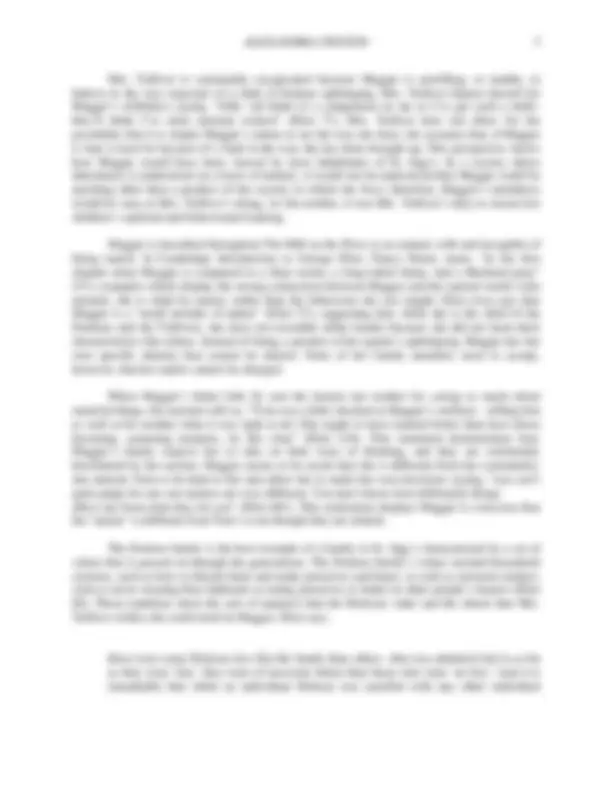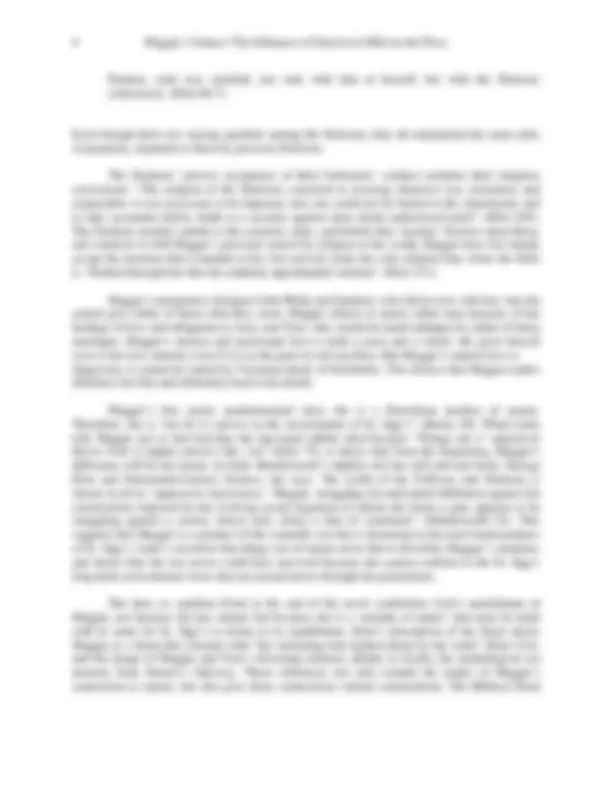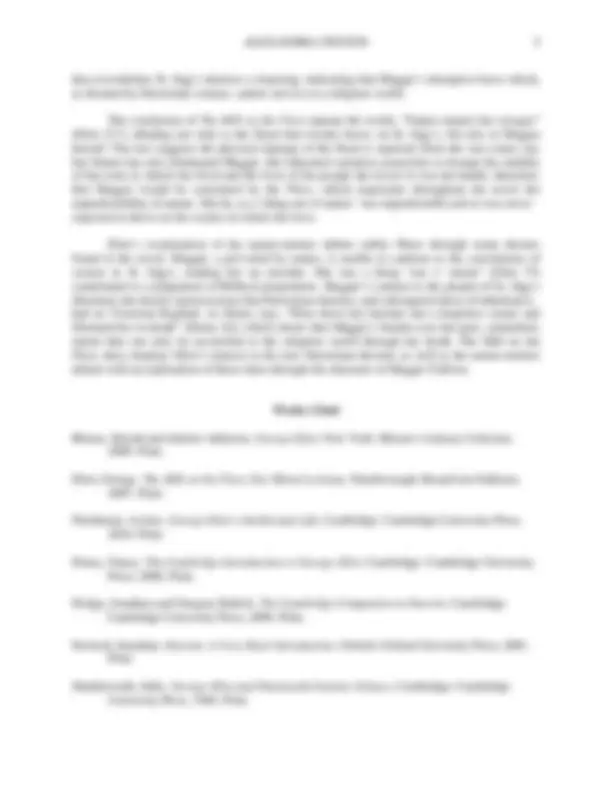





Study with the several resources on Docsity

Earn points by helping other students or get them with a premium plan


Prepare for your exams
Study with the several resources on Docsity

Earn points to download
Earn points by helping other students or get them with a premium plan
Community
Ask the community for help and clear up your study doubts
Discover the best universities in your country according to Docsity users
Free resources
Download our free guides on studying techniques, anxiety management strategies, and thesis advice from Docsity tutors
George Eliot's The Mill on the Floss was published in 1860 against a backdrop of drastic scientific upheavals in Victorian England. Even before the publication ...
Typology: Exams
1 / 5

This page cannot be seen from the preview
Don't miss anything!




Maggie’s Nature: The Influence of Darwin in Mill on the Floss Alexandra Fenton
George Eliot’s The Mill on the Floss (1860) demonstrates the author’s questioning of traditional belief, human compassion, and personal morality. Maggie Tulliver’s quest for selfhood is frequently at odds with others’ attempts to mould her into a conventional gender role through family influence, social expectations, and education. She is alternately described as “a wild thing,” “a Bedlam creatur,” and a “mistake of nature,” or some kind of small animal, such as a “Shetland pony” or a “Skye terrier.” These references establish Maggie’s singularity and demonstrate how other characters perceive her intelligence, passion, and strong will as unnatural. They also help illustrate Eliot’s great interest in the contemporary scientific debates. In fact, Eliot read Charles Darwin’s On the Origin of the Species (1859) after she had begun work on Mill, and her partner, George Henry Lewes, was simultaneously researching his Studies in Animal Life (1862). In her essay, Alexandra Fenton outlines Eliot’s careful exploration of aspects of social Darwinism and natural selection, particularly the nature-nurture debate. Maggie’s inherited nature conflicts with the lessons imparted by her family and society, and, as Fenton argues, it is inevitable that she be consumed by the Floss, a river that “represents the unpredictability of nature, because she, as a ‘thing out of nature,’ was never expected to thrive in the society in which she lives.”
- Dr. Vicky Simpson
George Eliot’s The Mill on the Floss was published in 1860 against a backdrop of drastic scientific upheavals in Victorian England. Even before the publication of Charles Darwin’s On the Origin of Species, there were debates in the scientific community pertaining to the question of how the human character was defined. One of the most prevalent discussions was the divide between those who thought traits were inherited through genes (nature), and those who thought character was defined by what was taught by society (nurture). Maggie Tulliver, the tragic heroine in The Mill on the Floss , is a Darwinian figure whose character is dictated by her inherited nature, not by the lessons her parents have imparted to her. Maggie’s characteristic wildness and ability to feel intense love lead her to make unconventional choices, and throughout the novel she is punished for that difference. The other characters in the town of St. Ogg’s, such as the Dodsons and the Tullivers, represent the traditional view of inheritance, demonstrating the nurture side of the debate where identity is instilled by the family and the Church.
Darwin’s theory of evolution depended heavily on the maxim that sexual reproduction results in offspring that physically and characteristically resemble their parents (Howard 63). Darwin believed variations occur between parents and offspring because of some external force disrupting the reproductive process, resulting in a child that could not have been predicted from either parent (Hodge and Radick 6). He also believed that domestication, which in The Mill on the Floss is the result of nurture, creates variation only after “an extreme and sustained change in a species’ conditions of life” (Hodge 7). Darwin thought change in a species occurs over many generations and cannot be instilled through the nurturing of a parent. Darwin extensively researched finches on oceanic islands and realized birds on diverse islands had evolved differently due to variations that had become engendered in each species (Howard 52-53). Darwin’s conclusions about the finches suggest that transmutation is so gradual that the influence of parents on their child cannot change its fundamental nature. Darwin believed,
2 Maggie’s Nature: The Influence of Darwin in Mill on the Floss
therefore, that the purest and truest beings were products of nature that have not been affected by variation of any sort (Hodge 104).
With this understanding, it is easy to see how in the society of St. Ogg’s “there had been no highly modifying influence to act on [the Tullivers and Dodsons] in their maturer [sic] life” (Eliot 296). The people of St. Ogg’s have had no cause for variation because there have been no great disturbances in their “species”. Eliot tells us Maggie is the result of a “mistake of nature” (Eliot 57), whose variation cannot be changed by nurture. Mrs. Tulliver’s attempts to nurture Maggie and make her fit in with society are fruitless because Maggie has evolved away from her society to such an extent that she cannot conform.
The nature-nurture debate arose out the Darwinian theories of evolution, variation, and heredity. These ideas changed relationships between parents and children because they revealed that physical and personality traits were the result of natural inheritance. This development threw the Christian assumption that the way a child is raised is crucial to development into turmoil. At the time, it was believed that children were born tabula rasa (blank slate) with the understanding that character was formed through parental and societal influences. In the past, this assumption meant that everything known by an individual was the result of perception and experience and supported the idea of spiritual training for children, which would lay the foundation for religious conviction later in life. Eliot shows the implications of this shift in belief through Maggie’s character, when she is unable to adhere to the training that her parents try to give her and acts purely based on her natural impulses.
Eliot’s relationship with George Henry Lewes is often considered to be the source of her scientific knowledge (Bloom and Atkinson 1). As a naturalist, Lewes was acquainted with many of the most notable scientists of the time, including Thomas Henry Huxley and Herbert Spencer (Bloom 7), who were intimately influenced by and connected to Darwin’s theories of evolution and inheritance. Through these connections, Eliot read Darwin’s On the Origin of Species for the first time while she was writing The Mill on the Floss (Henry 20). Eliot also accompanied Lewes on many of his naturalist excursions, and through these experiences, became well informed about the scientific and natural discoveries of the time, including the debate on genetic inheritance. Avrom Fleishman argues in his book, George Eliot’s Intellectual Life,
The common strain in all naturalisms is awareness of science as a mode not merely of description but of dispassionate and non-judgmental explanation, especially of human behaviour. Social conditioning, inevitable consequences, in variable laws are variously invoked; none of these is definitive for the category, nor do they appear in unequivocal ways in Eliot’s fiction. (Fleishman 95)
Fleishman makes it clear that Eliot’s writing cannot be considered naturalist fiction per se, but her works are “marked by traits of the naturalist tradition, within the broader domain of realism” (Fleishman 95), and although Eliot cannot be considered a naturalist writer, her works are still concerned with broader scientific ideas.
4 Maggie’s Nature: The Influence of Darwin in Mill on the Floss
Dodson, each was satisfied, not only with him or herself, but with the Dodsons collectively. (Eliot 86-7)
Even though there are varying qualities among the Dodsons, they all maintained the same rules of propriety, imparted to them by previous Dodsons.
The Dodsons’ passive acceptance of their forbearers’ conduct includes their religious convictions: “The religion of the Dodsons consisted in revering whatever was customary and respectable: it was necessary to be baptised, else one could not be buried in the churchyard, and to take sacrament before death as a security against more dimly understood perils” (Eliot 295). The Dodsons meekly submit to the customs, rules, and beliefs that ‘nurture’ bestows upon them, and contrasts it with Maggie’s personal search for religion in her youth. Maggie does not simply accept the doctrine that is handed to her, but actively seeks her own religion that, when she finds it, “flashed through her like the suddenly apprehended solution” (Eliot 311).
Maggie’s uniqueness intrigues both Philip and Stephen, who fall in love with her, but she cannot give either of them what they want. Maggie refuses to marry either man because of her feelings of love and obligation to Lucy and Tom, who would be made unhappy by either of these marriages. Maggie’s intense and passionate love is both a curse and a virtue: she gives herself over to her love entirely even if it is at the peril of self-sacrifice. But Maggie’s natural love is dangerous: it cannot be tamed by Victorian ideals of femininity. The choices that Maggie makes influence her fate and ultimately lead to her death.
Maggie’s fate seems predetermined since she is a Darwinian product of nature. Therefore, she is “not fit to survive in the environment of St. Ogg’s” (Henry 20). When Luke tells Maggie not to feel bad that the lop-eared rabbits died because “Things out o’ naturniver thrive: God A’mighty doesn’t like ‘em” (Eliot 75), it shows that from the beginning, Maggie’s difference will be her doom. In Sally Shuttleworth’s slightly old, but still relevant book, George Eliot and Nineteenth-Century Science, she says, “the world of the Tullivers and Dodsons is shown in all its ‘oppressive narrowness.’ Maggie, struggling for individual fulfilment against the constrictions imposed by the evolving social organism of which she forms a part, appears to be struggling against a society whose only virtue is that of continuity” (Shuttleworth 52). This suggests that Maggie is a product of the scientific era but is drowning in the rural backwardness of St. Ogg’s. Luke’s assertion that things out of nature never thrive describes Maggie’s situation, and shows that she was never could have survived because she cannot conform to the St. Ogg’s long-held conventional views that are passed down through the generations.
The deus ex machina flood at the end of the novel symbolizes God’s punishment of Maggie, not because she has sinned, but because she is a ‘mistake of nature’ that must be dealt with in order for St. Ogg’s to return to its equilibrium. Eliot’s description of the flood shows Maggie as a Siren-like creature with “her streaming hair dashed about by the wind” (Eliot 514), and the image of Maggie and Tom’s drowning embrace alludes to Scylla, the mythological sea monster from Homer’s Odyssey. These references not only remind the reader of Maggie’s connection to nature, but also give these connections sinister connotations. The Biblical flood
that overwhelms St. Ogg’s denotes a cleansing, indicating that Maggie’s disruptive force which, as dictated by Darwinian science, cannot survive in a religious world.
The conclusion of The Mill on the Floss repeats the words, “Nature repairs her ravages” (Eliot 517), alluding not only to the flood that wreaks havoc on St. Ogg’s, but also to Maggie herself. The text suggests the physical damage of the flood is repaired when the sun comes out, but Nature has also eliminated Maggie. Her inherited variation caused her to disrupt the stability of the town in which she lived and the lives of the people she loved. It was inevitable, therefore, that Maggie would be consumed by the Floss, which represents throughout the novel the unpredictability of nature. She he, as a ‘thing out of nature’ was unpredictable and so was never expected to thrive in the society in which she lives.
Eliot’s examination of the nature-nurture debate subtly filters through many themes found in the novel. Maggie, a girl ruled by nature, is unable to conform to the conventions of society in St. Ogg’s, making her an outsider. She was a thing “out o’ nature” (Eliot 75) condemned to a judgement of Biblical proportions. Maggie’s contrast to the people of St. Ogg’s illustrates the drastic repercussions that Darwinian theories, and subsequent ideas of inheritance, had on Victorian England. As Henry says, “Eliot drove her heroine into a hopeless corner and liberated her in death” (Henry 62), which shows that Maggie’s burden was her pure, animalistic nature that can only be reconciled to the religious world through her death. The Mill on the Floss, then, displays Eliot’s interest in the new Darwinian theories as well as the nature-nurture debate with an exploration of these ideas through the character of Maggie Tulliver.
Works Cited
Bloom, Harold and Juliette Atkinson. George Eliot. New York: Bloom’s Literary Criticism,
Eliot, George. The Mill on the Floss. Ed. Oliver Lovesey. Peterborough: Broadview Editions,
Fleishman, Avrom. George Eliot’s Intellectual Life. Cambridge: Cambridge University Press,
Henry, Nancy. The Cambridge Introduction to George Eliot. Cambridge: Cambridge University Press, 2008. Print.
Hodge, Jonathan and Gregory Radick. The Cambridge Companion to Darwin. Cambridge: Cambridge University Press, 2009. Print.
Howard, Jonathan. Darwin: A Very Short Introduction. Oxford: Oxford University Press, 2001. Print.
Shuttleworth, Sally. George Eliot and Nineteenth-Century Science. Cambridge: Cambridge University Press, 1984. Print.